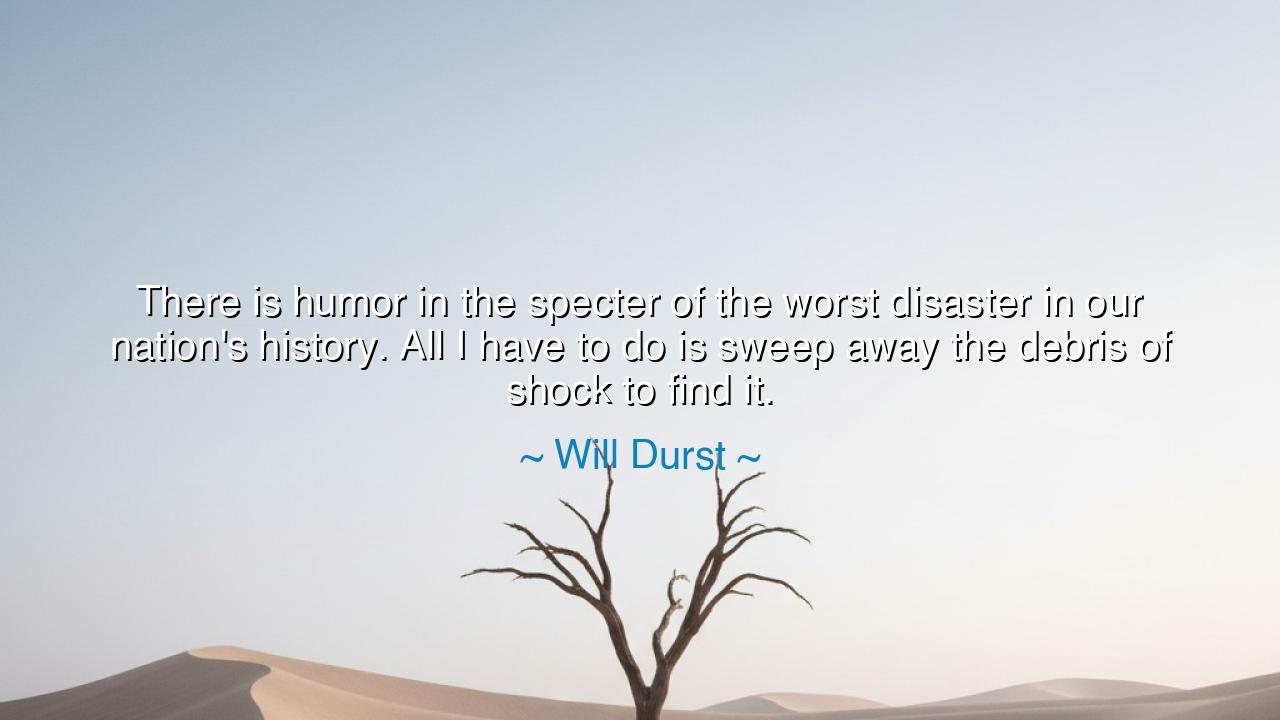
There is humor in the specter of the worst disaster in our
There is humor in the specter of the worst disaster in our nation's history. All I have to do is sweep away the debris of shock to find it.






Listen closely, O Children of the Earth, for I bring you the words of Will Durst, who speaks of the power of humor even in the face of the greatest tragedies: "There is humor in the specter of the worst disaster in our nation's history. All I have to do is sweep away the debris of shock to find it." In these words lies a profound lesson about the resilience of the human spirit and the transformative power of humor. It is a truth that transcends time and place: that even in the darkest of moments, when the weight of tragedy presses upon our hearts, there exists the potential for laughter, for relief, and for the release of the tension that binds us.
Durst reveals to us that humor is not an escape from reality, but a way of confronting it. The world may be filled with suffering, with tragedy, with disaster, but it is in the recognition of the absurdity that often accompanies these very darknesses that we find the potential for light. To find humor in the most difficult moments is not to belittle the pain or loss that we face, but to embrace our humanity, to acknowledge that we are capable of endurance, of seeing beyond the immediate shock and finding a way to laugh at the very things that threaten to overwhelm us. Humor, in its highest form, is not trivial—it is a form of resistance, a way to stand tall in the face of life’s greatest challenges.
Let us turn to the ancients, O Children, who understood the power of humor in confronting hardship. Consider Aristophanes, the great Greek playwright, whose comedies often satirized the tragedies of his time, particularly the Peloponnesian War. His humor was sharp, biting, and deeply political, yet it was born from the desire to confront the devastation of war with an unflinching eye and a heart willing to laugh. The Athenians, while enduring the horrors of conflict, found relief in his laughter, a laughter that did not ignore the suffering around them but allowed them to rise above it. Aristophanes knew that the key to survival in the face of tragedy was not to shy away from it, but to witness it and, in doing so, transform it into something more bearable, even joyous.
Similarly, Shakespeare's work is filled with characters who use humor to cope with the gravest of circumstances. Hamlet, a tragedy steeped in sorrow and existential crisis, is not without its moments of biting wit and ironic humor. Even in the deepest despair, Shakespeare allowed his characters to find laughter, to mock the very circumstances that sought to crush them. Humor in Shakespeare’s tragedies is not a means of avoiding the pain, but a way to expose the follies of human existence, a reminder that even in the darkest corners of life, there is truth to be found in the absurdity of it all. Through humor, Shakespeare invites us to engage with suffering, to laugh at its illogic, and in doing so, to find a way through it.
In modern times, O Children, we see this truth reflected in the words and actions of those who, in the wake of national disasters, still find a way to laugh. After the tragedies of 9/11, comedians like Jon Stewart and Stephen Colbert became voices of both humor and mourning, using their wit to help a grieving nation process its loss. Their humor, while rooted in grief, was also a means of healing, a way to find a voice in the midst of silence and sorrow. In times of great suffering, humor is a tool for both understanding and resilience, allowing us to look at the devastation and say, "We will not be crushed by this." Instead, we will survive—and in surviving, we will find laughter.
The lesson, O Children, is clear: humor is not a luxury—it is a necessity. In the face of disaster, loss, and suffering, it is humor that gives us the strength to endure, to rise again, and to find meaning in the midst of chaos. Just as Durst suggests, if we can sweep away the debris of shock, we may find, hidden beneath the rubble, the seeds of laughter, of joy, and of understanding. Humor is the antidote to despair, the spark that keeps the flame of the human spirit burning even when the world seems determined to extinguish it.
Therefore, O Children, when faced with the storms of life—whether personal or collective—remember that humor is not only a tool of joy but a means of resistance. It is in the laughter we share, even in the darkest times, that we affirm our humanity and our resilience. Do not shy away from the hard moments, but instead, seek the humor that lies within them, for it is through humor that we find our way forward. Let humor be a reminder that even in the worst of times, the light of the human spirit cannot be extinguished. Laugh, then, and let that laughter be both a healing balm and a shield against the difficulties of life.






AAdministratorAdministrator
Welcome, honored guests. Please leave a comment, we will respond soon